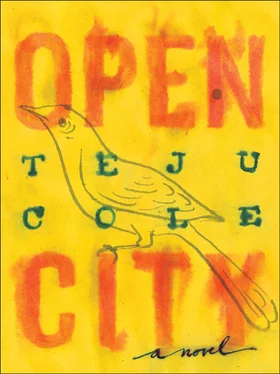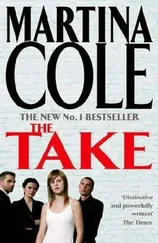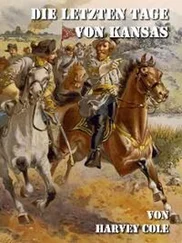Then I saw that there was no organist playing at all. The music was recorded and piped in through tiny speakers attached to the massive piers at the crossing. And I saw, also, the source of the fracture in the sound: a small yellow vacuum cleaner. The high-pitched hum from the machine had risen and mixed with the recorded organ music to create diabolus in musica . The woman who was cleaning did not look up from her work. She wore a bright green scarf, and a coat that reached down to the floor. She moved between the little wooden chairs of the north aisle. Instead of going into the crossing, I walked up the south aisle, toward the altar. The woman continued her work, fully absorbed, and the organ piece wove around the single, wavering hum of the vacuum cleaner.
A few weeks before, I would have assumed that the woman was Congolese. I had arrived in Brussels with the idea that all the Africans in the city were from the Congo. I knew the colonial relationship, I had a basic understanding of the history of the slave state there, and that had dislodged any other idea from my head. But then I went out one night to a restaurant and club on rue du Trône, a place called Le Panais. I spent the evening alone at my table, drinking and watching the young Congolese, all dressed up, fashionable, flirting with each other. The women wore afros or hair weaves, and many men wore long-sleeved shirts tucked into their jeans and looked particularly African, like recent arrivals. The music was American hip-hop, and the average age was twenty-five or thirty. It was a scene such as one would see in any city in Africa, or in the West: a Friday night, young people, music, liquor. After almost three hours, I paid for my drinks and was about to leave, and that was when the bartender came to talk to me. He asked where I was from, and we had a brief conversation; he was himself half-Malian and half-Rwandan. But what about the crowd, I wanted to know, were they all Congolese? He shook his head. Everyone was Rwandan.
The realization that I had been with fifty or sixty Rwandans changed the tenor of the evening for me. It was as though the space had suddenly become heavy with all the stories these people were carrying. What losses, I wondered, lay behind their laughter and flirting? Most of those there would have been teenagers during the genocide. Who, among those present, I asked myself, had killed, or witnessed killing? The quiet faces surely masked some pain I couldn’t see. Who among them had sought deliverance in religion? I changed my mind about leaving just then and instead ordered another drink. I watched the couples, watched the parties of four and five, watched the young men who stood in trios, who were obviously absorbed in the moving bodies of the beautiful young women. The innocence on view was inscrutable and unremarkable. They were exactly like young people everywhere. And I felt some of that mental constriction — imperceptible sometimes, but always there — that came whenever I was introduced to young men from Serbia or Croatia, from Sierra Leone or Liberia. That doubt that said, these, too, could have killed and killed and only later learned how to look innocent. When I finally left Le Panais, it was late and the streets were silent, and I walked the three and a half miles home.
Looking now at the woman in the church, as she slowly folded the telescoping tube of the vacuum cleaner, I thought that she, too, might be here in Belgium as an act of forgetting. Her presence in the church might doubly be a means of escape: a refuge from the demands of family life and a hiding place from what she might have seen in the Cameroons or in the Congo, or maybe even in Rwanda. And perhaps her escape was not from anything she had done, but from what she had seen. It was a speculation. I would never find out, for she possessed her secrets fully, as did those women that Vermeer painted in this same gray, lowland light; like theirs, her silence seemed absolute. I walked around the choir and, when I passed her by in the north aisle, only nodded to her, before heading out again. But near the entrance, there was suddenly someone else. I started. I hadn’t seen him walk up behind me: a middle-aged white man with a full beard. A vicar or sexton, I guessed. He ignored me, and went on his way across the south choir aisle with soundless footfall.
AT THE ENTRANCE OF THE RESTAURANT, TELEVISION NEWS WAS on, with the volume turned low. On the screen was an aerial shot of choppy waters, which captions identified as la Manche , the English Channel. I could just make out that a container vessel had run into trouble in the storm, and all twenty-six crew members had gone overboard on life rafts. The ship, rectangular and orange, looked like a toy, listing dangerously in the swelling sea, and, all around its inundated form, tiny orange life rafts bobbed. The camera cut to a weather report, which said that the storm was spreading across Europe and moving swiftly eastward. There was already serious damage in Germany: a collapsed bridge, swathes of snapped trees, and smashed cars. Then someone touched my arm. It was Dr. Maillotte. She kissed me on the cheek and said, It’s never this bad, this is the strangest winter we’ve had in years; come, let us eat. Then she added, Wait, I forgot, you prefer English, yes? Okay, I’ll remember, we’ll speak English.
We sat near a big window that came down to floor level, on the other side of which the rain descended like a sheet. She said she had just had a meeting about a foundation she was involved with. I hate meetings, she said, some things are much easier if one person decides. It was easy to imagine what her style was like in the operating room, or at an official meeting. She broke off a piece of a bread roll, chewing quickly as she studied the menu and said, almost randomly, Did we talk about jazz on the plane? I think we did, no? But if you like jazz, I’ll tell you about Cannonball Adderley. He was a patient of mine.
Her finely veined hands tore expertly into the bread. She looked much older, I thought, than when we had first met. Actually, she continued, it was his brother, Nat Adderley, who was my patient in Philadelphia. I had to take some gallstones out of him, and it was through Nat that I met Cannonball, and then Cannonball himself became my patient. He had high blood pressure, you see. Anyway, because of the Adderley brothers, we — my husband and I — met many of the notable jazzmen of the sixties. Chet Baker.
The waiter, a dead ringer for Obelix, arrived to take our orders: waterzooi for her, veal for me. She asked if I liked wine, I said yes, and she ordered a carafe of Beaujolais. Philly Joe Jones, the drummer, and Bill Evans, too. You know Art Blakey? Cannonball liked to introduce people to each other, so we met all kinds of characters through him. We went to too many concerts to count. Not as many after Cannonball died, in the mid-seventies. He had a stroke and, like all these other men, he was terribly young. Forty-two or forty-six, something like that.
I was happy to be there, and enjoyed the way she pulled each vignette like a rabbit out of a hat. The names of the jazz artists Dr. Maillotte was now listing meant nothing to me, but I could tell that she had gotten something extraordinarily meaningful out of having been part of, or rather having fallen into, that milieu.
I became aware of just how fleeting the sense of happiness was, and how flimsy its basis: a warm restaurant after having come in from the rain, the smell of food and wine, interesting conversation, daylight falling weakly on the polished cherrywood of the tables. It took so little to move the mood from one level to another, as one might push pieces on a chessboard. Even to be aware of this, in the midst of a happy moment, was to push one of those pieces, and to become slightly less happy. And your husband, I said, does he not come to Brussels as often as you? No, she said, he’s much happier in the States. I think he slowly lost his connection to Belgium. For me, it’s my friends that keep me coming back. And also the fact that I just can’t stand American public morals. And you, do you go to Nigeria a lot? I don’t, I said. My last visit happened two years ago, and that was after a gap of fifteen years; and it was a brief visit. Being busy all these years was part of it, and losing some of the connection, as you said, also plays a role. Also, my father died not long before I left, and I have no siblings.
Читать дальше












